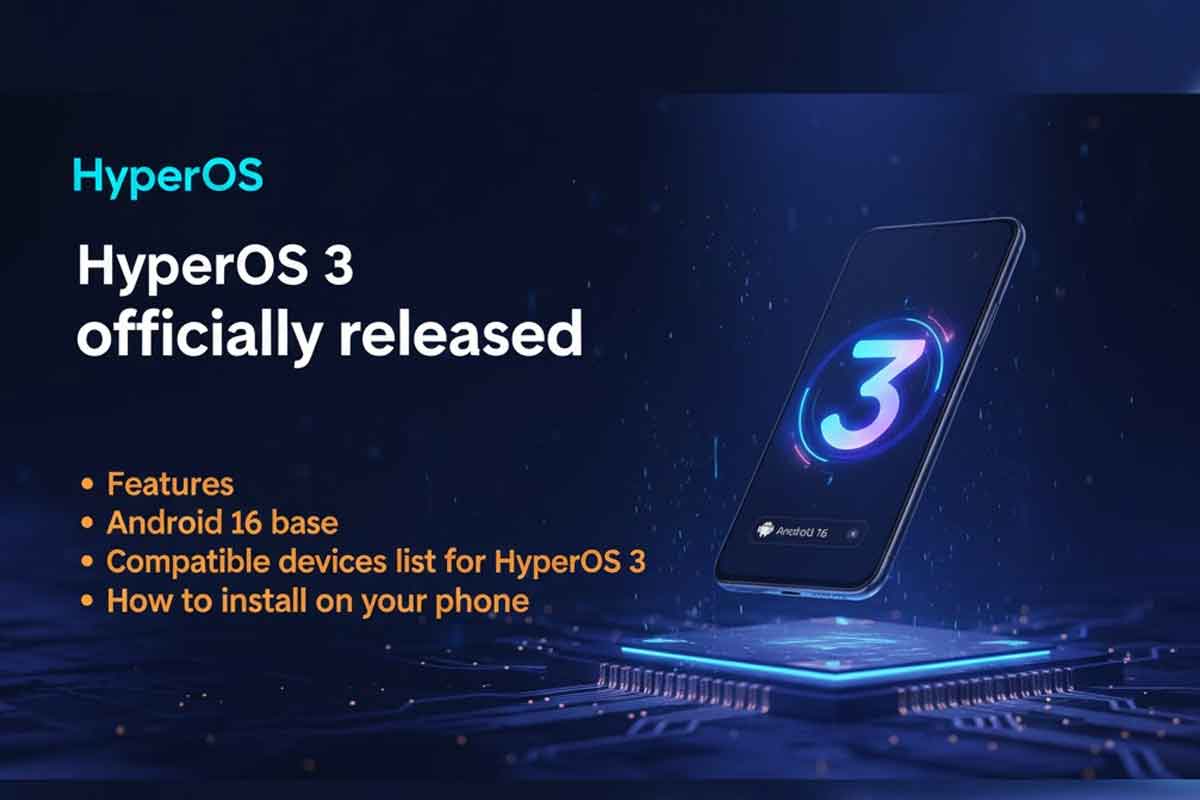HyperOS 3 is Xiaomi’s latest software experience built on Android 16, and it has now been officially released in stable form for a growing list of devices. The update is rolling out across Xiaomi, Poco and Redmi phones and tablets, including premium models like Xiaomi 14 and newer 15-series phones. For many users, HyperOS 3 feels like a major refinement rather than a small patch, with clear focus on smooth animations and long-term performance.
Product Intro
Positioned as the next stage of Xiaomi’s custom skin, HyperOS 3 replaces earlier HyperOS builds with a cleaner look, tighter integration with cloud services and better cross-device connectivity. It arrives as a free HyperOS 3 Update in batches, starting with flagships and then moving to upper mid-range Poco and Redmi models. In markets like HyperOS 3 India, the rollout window is set around October–November 2025, with more devices joining through early 2026.

Key Features of HyperOS 3 and Version
Xiaomi’s HyperOS 3 introduces several visible and under-the-hood changes. Key features include:
- Updated system UI with smoother transitions, refreshed icons and widgets
- New privacy dashboard and clearer permission controls
- Improved AI features for photos, text suggestions and smart categorisation
- Better continuity between phones, tablets and IoT devices in the Xiaomi ecosystem
- HyperOS 3 launcher optimisations to reduce stutter and improve scrolling
The current stable builds are labelled in the OS3.0.x series, reflecting the third major generation of Xiaomi’s HyperOS platform.
Performance
According to Xiaomi’s own claims and early technical reviews, HyperOS 3 improves overall performance significantly compared to the previous build. App load times are reduced, frame drops in games are lower and background memory handling is smarter on compatible chipsets. Users on newer Poco and Redmi phones report that animations feel more consistent and that heavy apps recover more quickly when switching between tasks.
Price
HyperOS 3 does not carry any separate price tag. It is delivered as a free over-the-air upgrade for eligible Poco, Redmi and Xiaomi 14 series devices. The only cost to users is data usage during download, so using Wi-Fi is recommended.
HyperOS 3 Detail
Xiaomi is rolling out HyperOS 3 in waves around the world. The first stable release started in October 2025, targeting high-end phones and tablets, and has since expanded to more regions and models. In India, Xiaomi has formally confirmed the launch of HyperOS 3 with a phased schedule, meaning not all devices receive the update on the same day. The update file size typically ranges from a few gigabytes depending on device and region.
Compatible Devices List for HyperOS 3
The full list is long and continues to grow, but some of the key models confirmed to receive the HyperOS 3 Update include:
- Xiaomi flagship series: Xiaomi 15, Xiaomi 15 Ultra, Xiaomi 15T, Xiaomi 15T Pro and Xiaomi 14 / 14 Ultra
- Redmi series: Redmi Note 14 Pro+, Redmi Note 14 Pro, Redmi Note 14 and newer Redmi mid-range lines
- Poco series: Poco F7 Ultra, Poco F7 Pro, Poco F7 and Poco X7 / X7 Pro, plus selected Poco M and X devices
- Tablets: Xiaomi Pad 7 and Xiaomi Pad Mini in supported regions
Additional Xiaomi, Poco and Redmi devices are being added as Xiaomi completes testing, so users should keep checking the system update page on their phone.
How to Install
1. Install via OTA (Recommended)
- Charge your phone to at least 50% and connect to Wi-Fi.
- Open Settings > About phone.
- Tap the current HyperOS version to open the update screen.
- Press Check for updates.
- If HyperOS 3 Update is available, tap Download and then Install.
2. Install via Local Package (Advanced Users)
- Download the official HyperOS 3 package for your exact model from Xiaomi’s support area.
- Copy the file to your phone’s internal storage.
- Go to Settings > About phone > System update.
- Tap the menu icon and select Choose update package.
- Pick the file and confirm; wait while the phone installs and reboots.
Always back up important data before updating, especially if you are using the manual method.
Reviews / Market Response
Early community feedback around HyperOS 3 has been positive. Users with newer Xiaomi 14 and Poco F-series devices highlight smoother gaming performance, cleaner UI transitions and better standby battery life. Redmi owners note that even mid-range hardware feels more responsive after a few days of background optimisation. Some bugs are still being reported in early builds, but overall the market response suggests that HyperOS 3 is a solid upgrade for compatible phones.
Disclaimer
This article is based on current public information about HyperOS 3, its rollout schedule and device eligibility at the time of writing. Xiaomi may change its update roadmap, add or remove devices from the compatibility list or modify features in future patches. For exact details on HyperOS 3 India rollouts and specific Poco, Redmi and Xiaomi 14 builds, users should refer to official Xiaomi announcements and in-phone system update notifications.
FAQs
Q1. Is HyperOS 3 available for Xiaomi 14 now?
Yes, Xiaomi 14 models are included in the early HyperOS 3 rollout. Availability may still depend on your region and carrier, so check the system update section in Settings regularly.
Q2. Will all Poco and Redmi phones get HyperOS 3?
No, only selected Poco and Redmi devices are on the official compatible devices list for HyperOS 3. Newer mid-range and flagship models are first in line, while older phones may stay on previous versions with security patches only.
Q3. Do I need to pay for the HyperOS 3 Update?
No, HyperOS 3 is provided as a free update by Xiaomi for eligible devices. You only need enough storage space and a stable internet connection to download and install it.